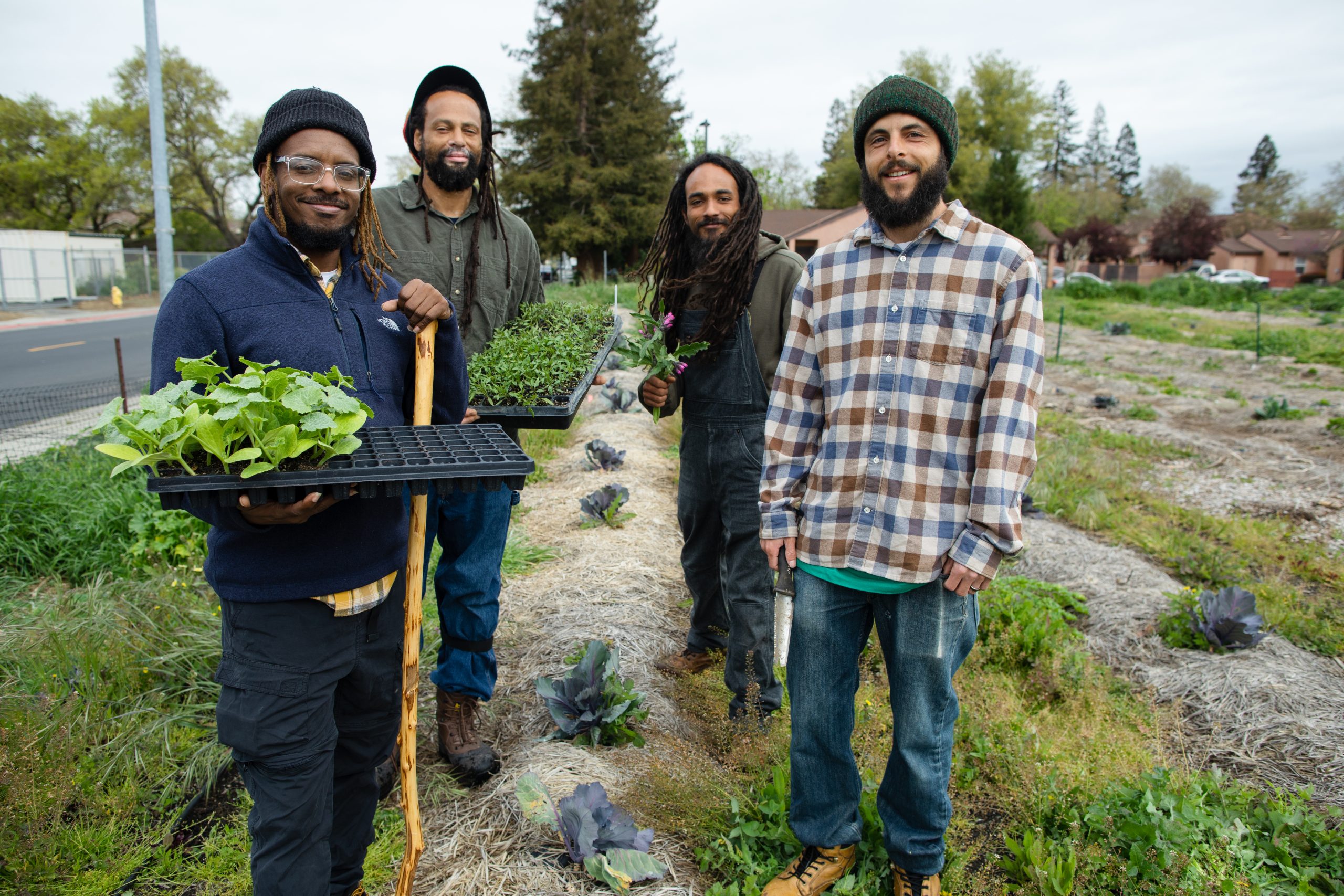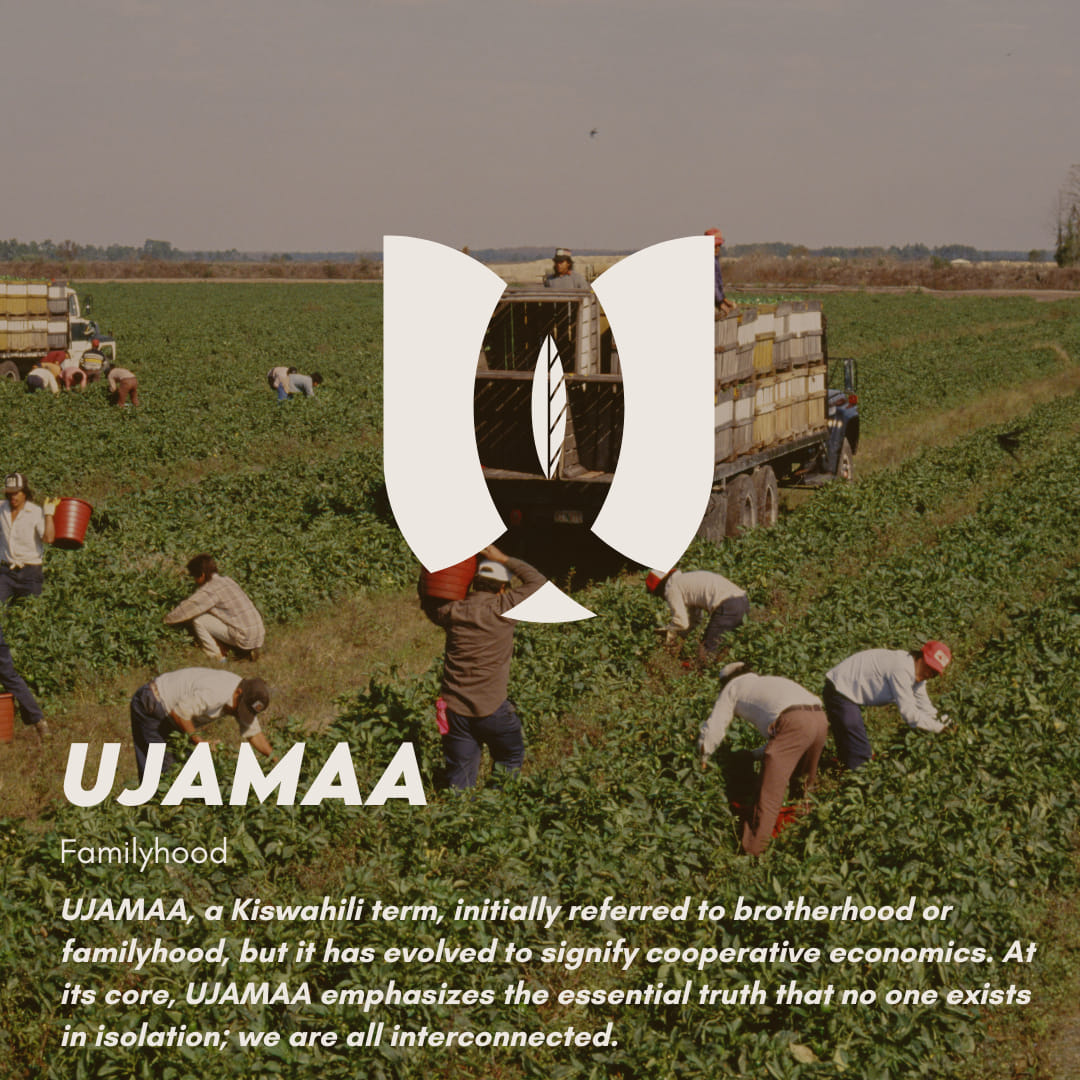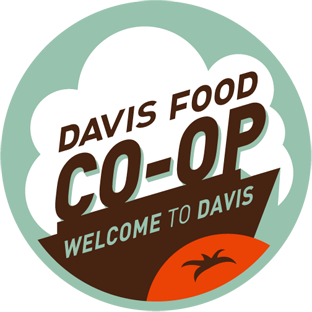Each year, the Co-op donates $0.10 for every pound of apples sold over the course of a year through our “Apple-a-Day” program. With 61,959 lbs of apples sold from July 2022 – June 2023, we were left with $6,196 to donate to a local organization.
For this year’s donation, we have chosen Ujamaa Farmer Collective
as our recipient.
as our recipient.
The $6,196 donation will directly support the Collective’s fundraising efforts to “build a Black-led, BIPOC-centered agriculture business cooperative committed to providing long-term, affordable land access for multiple existing BIPOC farmers/ranchers struggling with land security” here in Yolo County. In this blog we will tell you more about the vision of the Ujamaa Farmer Collective and how you can help them achieve their goals.

Ujamaa Farmer Collective Leadership Team
(pictured from left to right):
Keith Hudson (Grocery Croppers, LLC),
Brian Pinkney (We Grow Urban Farm),
Nathaniel Brown (Brown Sugar Farm),
Nelson Hawkins (We Grow Urban Farm)
To best understand these goals, we must first consider some historical context. In 1910, around 14% of farmers* in the US were Black and they owned more than 16 million acres across the country. Today only around 1% of US farmers are Black while nearly 95% are White. Many factors over the past 100 years have led to such a sharp decline.
* It should be noted that “farmer” is also known as “producer” in these counts and consists of a farm’s owner, a member of the owner’s family, a manager, a tenant, a renter, or a sharecropper and does not include the employees (known as farmworkers).
Since the early 20th century, Black farmers have faced a long history of injustices including unequal access to credit and federal aid. The United States Department of Agriculture (USDA) has faced multiple lawsuits, including the landmark case of Pigford v. Glickman in 1999, for its history of discriminatory practices that have limited Black farmers’ abilities to invest in their farms and acquire land. Compounding these economic challenges, many Black farmers deal with the complex issue of heirs’ property – a form of land ownership that arises when a landowner dies without a will, leading to the vulnerable division of property amongst the deceased’s heirs. This precarious situation resulted in a 90% decline in Black-owned farmland nationwide between 1910 and 1997, resulting in an estimated capital loss of $326 billion . In addition to these systemic inequities, Black landowners have also faced intimidation, violence, and illegal land seizures, all furthering the gap in land access for Black farmers.
Enter the Ujamaa Farmer Collective. Meaning “fraternity or familyhood” in Swahili, the term “Ujamaa” is the fourth principle of Kwanzaa created through cooperative economics as a practice of shared social wealth and the work necessary to achieve it.This is at the root of what the Ujamaa Farmer Collective hopes to achieve. Created by a compassionate group of advocates within the CDFA BIPOC Advisory Committee, the Collective has been created to work towards addressing the challenge of land tenure amongst historically underserved farmers.
Built upon the work of AB 1348: The Farmer Equity Act, the Collective notes in a blog on the Kitchen Table Advisors website that their focus is “to provide land for BIPOC farm businesses to steward through long-term, affordable leases. These leasing opportunities, ranging from ½ acre to 20-acre plots owned by the collective, will enable existing farm business owners to grow their operations on secure land parcels. The collective also aims to provide on-site housing for the farmers, allowing these business owners to fully immerse themselves in their farms while also raising and tending to their families”

The Collective has already successfully advocated for state funding to acquire a 50-100 acre parcel of land in Yolo County and recently attained counsel to aid them in establishing their 501(c)(3). They have raised $1.25 million towards their campaign goal of $2.5 million so far and are working with Possibility Labs as their fiscal sponsor to make this dream a reality. The work to choose and develop a site is underway as they continue to fundraise to build these equitable opportunities for Black and BIPOC farmers. While the Collective has made great progress, and the Co-op is happy to contribute towards that progress, the work is far from complete to reach their campaign goal of $2.5 million. That is where we are calling on our Co-op community to help support these continued efforts.

As a co-op in our community for the past 50 years, we know the power of collective effort to make changes in our local food systems. In recognizing that, we must also recognize that the changes that our co-op has influenced during that time have largely benefitted only White communities. As noted in an article on the Cool Davis website, supporting this project “is a once in a generation opportunity to do something well within our grasp that will have a significant positive impact right here at home. The impact will reverberate in all aspects of Yolo county racial equity lived experience, in our sustainable food system, in the resilience of our community”.

